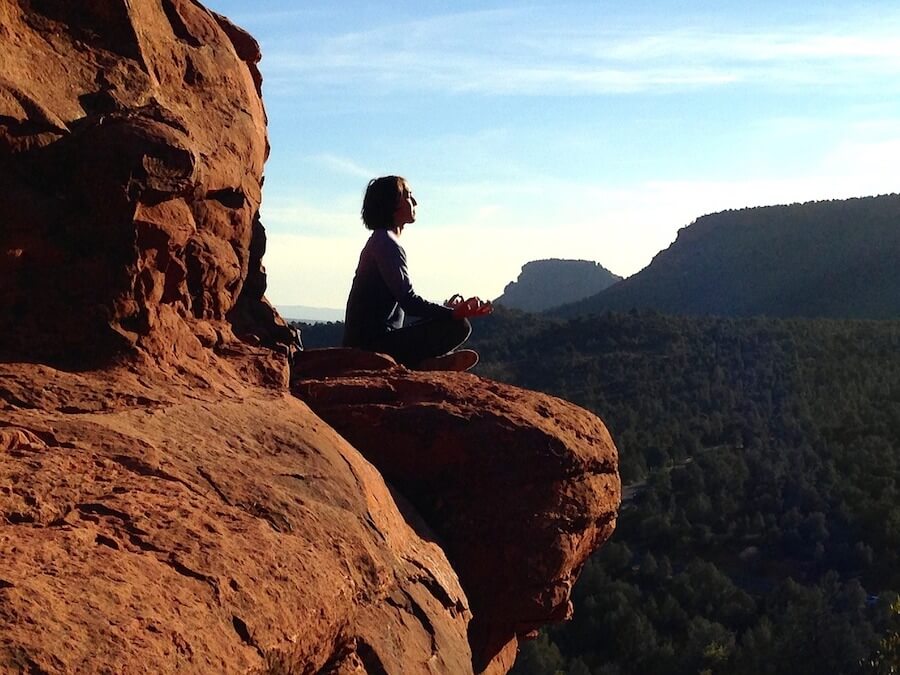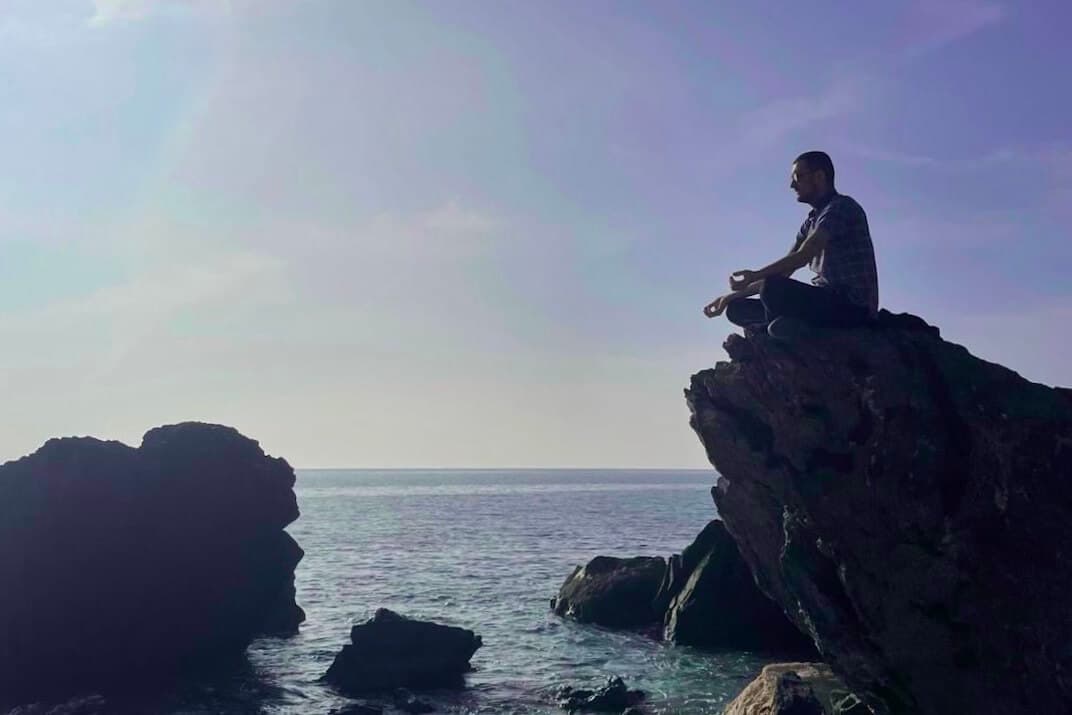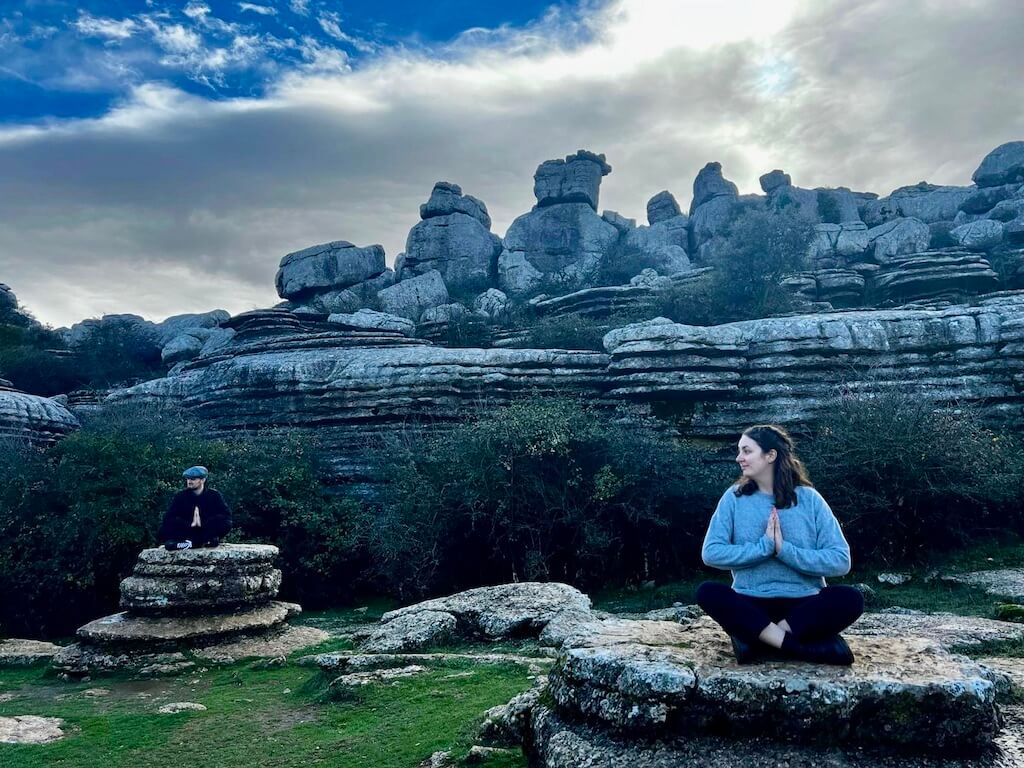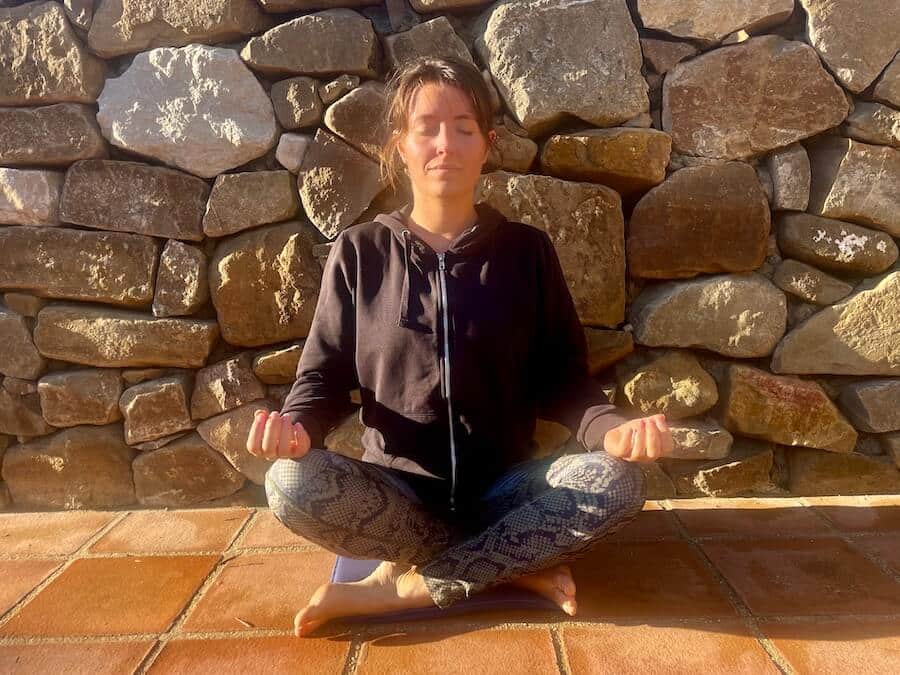Should you meditate in the dark?
If you’ve never tried it, meditating in the dark is a lovely experience which can super-charge your meditation and deepen your practice.
Sitting in the darkness shuts down those sensory reactions which are triggered by visual stimuli and this helps to entice you to connect more to your higher self and less with the outward environment.
If you have the opportunity, then I recommend trying it.
Meditating in the darkness is also believed to help open the third eye and activate the pineal gland, and in this article we explore the pros and cons of meditating without light.
But first of all, let’s take a look at the benefits of meditation in general so that we can compare the two.
Meditation helps you to transcend limitations even if you think you can’t meditate so that you can reach your true potential in life.
Table of Contents
Should You Meditate in the Dark? Overview
Meditating in the dark’s a great way to enhance your meditation practice and can take you to new depths in your meditation. It can also help to activate the pineal gland to release melatonin. If you have a dark room where you can meditate, it’s definitely worth trying. If you need the night to provide the darkness though, for some people, meditating late at night can also upset their day-night (circadian) rhythm and trick their inner clock into thinking it’s time to be awake when it isn’t. Also, you might actually miss out on your meditation because you fall asleep. So, meditating in the dark is great if you have somewhere to do it. If you’re meditating at night, give it a go and see if it fits with your own personal inner clock. For some people the darkness can trigger anxiety or fear, in which case it’s better to avoid meditating in the dark.
Benefits of Meditation in General
There are literally hundreds (if not more) of possible benefits you can get from meditation.
Everyone will experience a unique combination of benefits.
Meditating can re-wire your brain, improve your memory and focus, reduce stress and anxiety, lead to more productivity, help control anger issues, improve relationships and much more.
The possibilities become endless when you include the various ways and duration of meditating, which can range from taking a few moments of mindfulness in your busy day at the office, to full blown spiritual practice and sitting in silence for a full hour or more of deep meditation on a daily basis.
But despite the individual variations, there are many commonly shared benefits which are experienced by a large number of meditators, and which seem to be across the board.
And they aren’t just speculative. Many of these health benefits have been proven in tests.
Even if you think you can’t meditate, or you wonder whether it’s possible to meditate in a noisy environment, you can still gain these benefits, and it is always possible.
Obviously, your own particular experience will be unique, but here are some of the most commonly experienced benefits of meditation.
Meditating can benefit you in many, many ways. Some benefits might be tangible for you, while others may be more subtle. And even others may not occur in your practice at all or not to your knowledge.
It’s like the question of how long it takes to learn mindfulness, some things come through faster for some people while others take longer.
And although these gains may not be immediately noticeable, over time they can build up to make a significant impact on you and your life.
The true benefits of meditation can be experienced when you find yourself able to take the gains from meditating with you throughout your daily life.
Emotional Benefits of Meditating
So, without further ado, here are some of the benefits of meditation . . .
- Increases ability to relax.
- Nourishes a more peaceful outlook on life.
- Trains the mind to remain calm even at the onset of stress factors.
- Helps to nurture positivity.
- Stimulates more awareness of the moment (mindfulness).
- Increases self awareness.
- Supports emotional stability.
- Creates more resilience.
- Increases patience.
- Boosts confidence.
- Helps creativity.
Physical Benefits of Meditating
The physical benefits of meditating include overall improved health and longevity. Here are some of the specific things that can be helped by meditating, listed in no particular order.
Meditation may . . .
- Improve quality of sleep.
- Fortify concentration.
- Sharpen the memory and focus.
- Boost mental health.
- Reverse or reduce symptoms of depression.
- Help treat or manage anxiety.
- Lower blood pressure.
- Reduce levels of cortisol, the stress hormone in the blood.
- Strengthen the immune system.
- Improve pain management.
- May reduce the risk of dementia
- Help in anger control management.
- Reduce symptoms of ADHA.
- Relieve or reduces frequency of headaches and/or migraines
- Reduce stress-related diseases.
- Can help treat substance abuse.
- Reduce symptoms of PTSD (post traumatic stress disorder).
- Help with weight control issues or eating disorders.
- May increase longevity.
Meditating in the Dark
Unlike meditating to music, which is a fairly modern creation, meditating in the dark dates back many thousands of years, possibly back as far as 5000 BC and according to an article in Time magazine, meditating in the dark comes from meditation practises in ancient Egypt and China, and is included in religions such as Judaism, Hinduism, Jainism, Sikhism and Buddhism.
In the practice of Taoism in China, meditating in the dark was often practised by highly accomplished monks who would go to a cave to practise a deep state of meditation and fasting.
The caves are seen as the core of the earth and a place similar to returning to the womb.
The effects of prolonged time spent in the dark have been studied for many reasons and dark room therapy is used for treating symptoms such as insomnia, depression and bi polar disorder among others.
In dark room therapy however, people are in the dark for a week or more at a time to improve their health and wellbeing. The changes which come about begin after day 3-4 of being in the dark and DMT, a psychedelic substance, is often produced by the brain after 6-7 days of being in complete darkness.
But I digress, living in the darkness for a week may not be the same thing as meditating in the dark, but dark room meditation is a great way to get deeper into your meditation.
And it may well help to activate the pineal gland, though it’s unlikely that you’ll experience a third eye opening just from sitting in the dark to meditate for 30 minutes a day.
If you approach your meditation with realistic expectations: in other words expect nothing and be open for everything, then you’ll get the most out of your practice. Begin to meditate expecting nothing more than to connect with your inner self and enjoy the relaxation and liberation from daily stress.
In this way, your meditation practice is bound to bring you great benefits and remember, there isn’t a wrong way to meditate.
Why Should You Meditate in the Dark?
When you sit in complete darkness, your sensory perceptions are altered. The part of the brain responsible for sight and sight-responses shuts down, while your sensory perception of emotions, feelings and intuition are heightened.
Sitting in complete blackness for more than 30 minutes can activate the pineal gland to secrete melatonin.
Benefits of Meditation in the Dark
The effects of meditation are powerful already, but when you practise in the complete darkness, you experience elevated focus and a greater depth to the meditation.
Meditating in the dark can be a powerful experience which elevates the whole meditation. Your connection may be deeper, your visualisations clearer and your practice of mindfulness more pure.
The pineal gland secretes a hormone called Melatonin and is activated in the dark and some people believe that by meditating in the dark you can help to activate the pineal gland.
Activation of the Pineal Gland
The pineal gland is about the size of a grain of rice and although it’s located in the centre of the brain, it’s located outside of the blood-brain barrier, directly behind the area between your two eyes.
It’s principal activity is to release the hormone melatonin in response to the daily light-dark cycle, with melatonin being released in the dark period of the 24 hour day.
Melatonin is instrumental in regulating the circadian system and sleep patterns, and has been used as a treatment for sleep-related issues. It also has anti-inflammatory, antioxidant, anticoagulopathic properties and endothelial protective effects.
It’s suggested that the pineal gland may be directly linked with longevity and mental health, possibly reducing the risk of Alzheimer’s disease, and a failing pineal gland is suggested to possibly be the cause of the start of the ageing process.
The pineal gland is also known in spiritual circles as the third eye, and opening the third eye represents a significant spiritual awakening. The pineal gland can also become calcified and inactive when not healthy.
Meditating in the dark can help to stimulate and activate the pineal gland.
Cons of Meditation in the dark
For some people it can pose a problem to meditate in the dark because of a fear of the dark. If this is the case, it would be best to work on your fear of the dark before starting your regular meditation in the dark.
Another problem can be actually creating a space in your house where you can shut out all the light. In this case you can practise meditating in the dark at night time when it’s easier to create a dark space, but remember that if you meditate late at night, you can confuse your circadian rhythms by sending the signal that it’s time to be awake, and you could alternatively actually find yourself falling asleep during meditation.
Pick the best time of the day for you and experiment with it.
Tips for Meditating in the dark
As with any meditation, be sure to wear loose clothes and sit in a comfortable upright position for your meditation. You can also meditate lying down, but you’re more likely to fall asleep this way, so maybe it’s better to practise dark meditation in an upright position.
Take the first five minutes or so to just sit in the dark with your eyes open as you stare into the darkness and allow it to absorb into your senses. Breath slowly and relax.
Begin your meditation only after you’ve relaxed and adjusted to the darkness surrounding you. If you skip this step you miss out on some of the positive effects of sitting in the dark.
You may choose to meditate with your eyes closed or your eyes open. If you want to do open eye meditation, allow your eyes to drop to about 45º angle and do not actually focus on anything. Just stare beyond the darkness with a glazed eye stare, not really looking at anything.
Otherwise, close your eyes and begin your meditation in the dark, paying attention to any emotions which arise or inner visions that appear.
When you finish your meditation in the dark, give yourself another 5 minutes to sit with your eyes open to digest the experience you’ve just had while still enveloped in darkness.
Final Thoughts on Should You Meditate in the Dark?
Sometimes I meditate in daylight and other times in the darkness. I prefer to meditate in the darkness if I’m doing a longer session.
The difference for me so far isn’t dramatic – but it is noticeable and for going deep into the silence and focusing on the breath I would choose to meditate in the dark, whereas for a shorter meditation or a guided meditation, I wouldn’t really have a preference between the two.
It all depends on what you’re seeking from your meditation practice. Meditation brings something different to everyone. For me, the connection between meditation and a vegan lifestyle is undeniable whereas for some people meditation is just a means of relaxation.
Likewise there are many people who prefer to meditate to music while others claim to go deeper when meditating in silence (me included).
Each type of meditation brings with it a different sensation.
My conclusion is that for a deep meditation, my preference would be to sit in the darkness. And you? Where do you like to meditate best?








